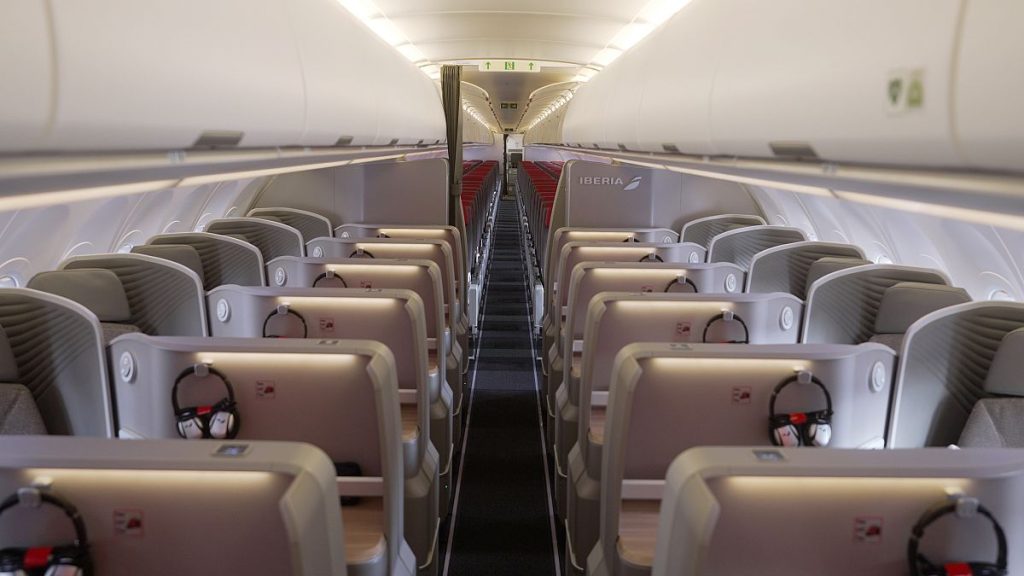Iberia Airlines has recently marked a significant achievement by operating its inaugural flight using the Airbus A321XLR, a next-generation aircraft that promises to redefine long-haul travel. This flight from Madrid to Boston, lasting approximately seven and a half hours, showcases the aircraft’s capabilities in providing a comfortable and efficient long-distance flying experience. The introduction of this model is set to change traditional airline configurations by enabling single-aisle interiors in narrow-body planes, making long flights more feasible and cost-effective while enhancing fuel efficiency. The Airbus A321XLR’s design emphasizes a passenger-centric approach, offering a more intimate cabin atmosphere that mirrors the experience of private jet travel.
Inside the A321XLR, Iberia has focused on creating an enjoyable environment for passengers, evidenced by the Airspace cabin configuration featuring 182 seats across two classes. The aircraft incorporates spacious overhead compartments, allowing for significantly increased luggage capacity—up to 60% more than typical airplanes. Technological advancements, such as a high-tech galley equipped with an espresso machine capable of brewing coffee in under 35 seconds, enhance the overall in-flight experience. The design also prioritizes hygiene, with features like antibacterial surfaces in the four available bathrooms, including one dedicated to business passengers. This attention to detail reflects a growing trend in modern air travel that values hygiene alongside comfort.
The business class on the A321XLR is particularly notable, with 14 individual seats that convert into fully flat beds and offer extensive storage options for personal items. Each seat is equipped with customizable lighting systems, providing passengers the ability to create their preferred ambiance. In-flight entertainment is delivered on high-resolution 18.5-inch screens, ensuring a pleasurable viewing experience for travelers. Additionally, Iberia enhances the culinary aspect of air travel by offering a selection of traditional Spanish tapas, including items like manchego cheese and Iberian jamón, further enriching the business class experience.
Economy class passengers aren’t left behind in terms of comfort and amenities. The 168 economy seats in the A321XLR also provide notable features such as a reclining option that extends up to 10 centimeters and a personal 12-inch 4K resolution screen for entertainment. The aircraft is equipped with modern charging facilities, including USB Type-A and Type-C ports, which cater to the needs of today’s tech-savvy traveler. Enhanced connectivity options allow all passengers to use their Bluetooth headsets, and complimentary Wi-Fi ensures that they remain connected throughout their journey.
One of the most significant innovations with the A321XLR is its enhanced operational range, enabling flights of up to 7,500 kilometers (4,000 nautical miles) due to an additional fuel tank. This variant of the Airbus A321 series offers a solution to the limitations faced by other aircraft, such as the A321LR, whose shorter range restricted transatlantic routing for many airlines. The A321XLR’s efficiency can’t be understated; it boasts a potential fuel savings of 30% per seat compared to older aircraft models, making it a compelling choice for airlines. Iberia’s president, Marco Sansavini, emphasized the importance of this aircraft in strengthening the airline’s route network and enhancing customer experience, marking a transformative step in the aviation industry.
Looking ahead, Iberia plans to expand its fleet with an additional seven A321XLR aircraft over the next 15 months, with new transoceanic routes—including Madrid to Washington Dulles—set to commence in January 2025. However, Iberia is not the only airline embracing this innovative aircraft; a total of 550 A321XLR orders have been placed by various commercial carriers, such as Aer Lingus and Wizz Air. Aer Lingus is expected to introduce its A321XLR with a flight from Dublin to Nashville, while Wizz Air is set to unveil its routes connecting London Gatwick to Jeddah and Milan to Abu Dhabi. The introduction of the A321XLR signals a new era in air travel, promising longer and more efficient routes while prioritizing passenger comfort and satisfaction.














